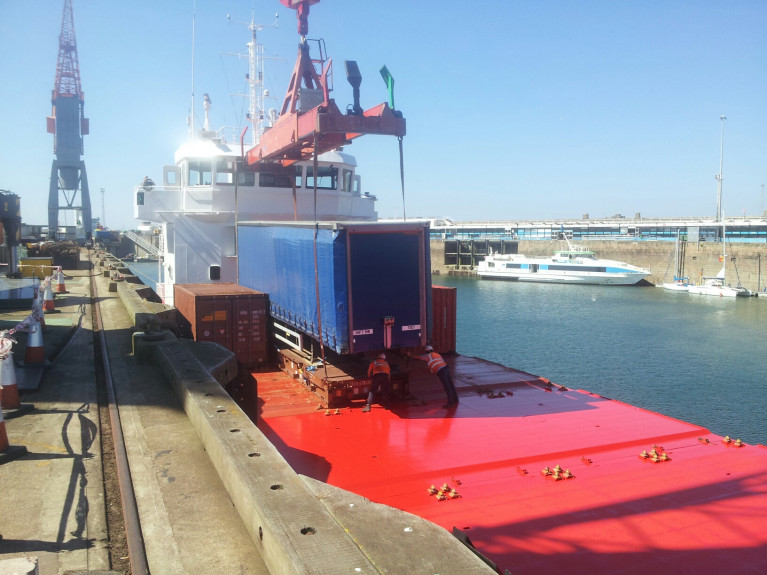Displaying items by tag: Noel Edmonds
Deal or No-Deal: Irish Flagged Cargoship from Cork Dockyard Heads to UK's 'Ferry' Brexit Waters
So where next? Afloat posed the question after the Irish flagged Huelin Dispatch departed Cork Dockyard last week and to initially anchor offshore prior to the ship's arrival in UK waters this week, writes Jehan Ashmore.
The Dundalk Shipping (DSC) Co Ltd owned Damen Combi-freighter after the dry-docking had for several days in Irish waters awaited orders from a charterer while off the mouth of Cork Harbour.
Now the cargoship is in the southern North Sea at Deal Anchorage off the east Kent coast. Deal is located where the English Channel meets the North Sea and is located equidistant between Dover (Britains busiest ferryport) and Ramsgate. Both ports are 8 miles apart of Deal.
This evening the aids to navigtion tender THV Patricia of Trinity House which departed their main marine depot in Harwich, Essex is too anchored off Deal though the Irish cargoship lies closer to Walmer as explained further below.
Huelin Dispatch had sailed through the English Channel and a transit of the Strait of Dover before taking anchorage offshore off Deal which took place on Monday night. The repositioning voyage might suggest the anchorage is more suited in a sea region geographically closer to numerous central north-west Europe ports and hence advantageous when the charterer recieves a call for further orders.
Nearby of Deal to the north is the Port of Ramsgate where in early 2019, the port hit the UK national headlines as one of several ports proposed to serve the UK in the event of a 'No-Deal' to secure essential and additional freight capacity with the EU and the rest of mainland Europe.
In a package announced in 2018 by the UK Government costed at £108m were contracts to French operator, Brittany Ferries, the Danish giant DFDS and Seaborne Freight to launch a service to Belgium by reviving the Ramgate-Ostend service subsequently cancelled.
However, The UK Transport Secretary reported Channel 4 News, faced controversary and calls for his resignation last year after the cancellation of a £14 million contract with ferry company Seaborne Freight. The government pulled the rug on the contract after revealing that Arklow Shipping – a firm which was set to be a majority shareholder in Seaborne – had itself backed out.
Channel 4 News also revealed that that company had never agreed any contract and blamed the UK government for pushing the deal through too fast.
Overall the most bizarre aspect of the story is that Seaborne Freight glaringly never traded nor had any ferries for that matter and therefore experience in running any such operation.
By coincidence the British game show, Deal or No Deal hosted by Noel Edmonds, was broadcast by Channel 4 for just over a year until it ceased in December 2016.
In that same year, ASL was a client of Cork Dockyard with the call of Arklow Rose, following the closure of Dublin Graving Docks Ltd with Arklow Fame becoming the last 'merchant' ship. The 220m graving dry-dock however was afterwards temporaily used for work on the 'static' museum timber built tallship Jeanie Johnston based on the nearby river Liffey.
As for Cork Dockyard which in 1995 was acquired by the Doyle Shipping Group (DSG) though the facility in Rushbrooke near Cobh is branded as the marine repair division in the Cork based shipping group.
Until recent years, Cork Dockyard has its own dedicated website, but it would appear for corporate rebranding purposes now forms part of the group's website of diverse shipping operations. Among them is shipping agency services with offices in all main Irish ports north and south.
As Afloat previously highlighted Cork Dockyard had among previous owners, the Damen Group which built Huelin Dispatch for Dundalk Shipping in 2012 at Bergum in the Netherlands. It is in that nation where at a shipyard in Schiedem where Townsend Thoresen Ferries (TTF) had also custom built the Free Enterprise VII completed in 1973, firstly to operate on the Dover-Calais/Boulogne Zeebrugge routes.
As for the present where Huelin Dispatch is in fact at anchorage closer to the other coastal Kent town of Walmer, where ferry aficionado's will note this location was the place name given to the renamed TTF ferry. That been the Pride of Walmer which continued to serve on the Strait of Dover but understood only to have operated to the Belgium port.
Before re-entering service, the ferry was radically rebuilt in Germany and not for the better at least in terms of exterior aesthetics and to put it politely, the ship emerged with a most ungainly appearance.
The 'Walmer' by 1987 was officially registered as part of new owners P&O Ferries which renamed the ferry Pride of Rathlin reflecting the route it was transferred to closer to home. This was the North Channel link of Larne-Cairnryan where the almost 30 year old ferry would remain until withdrawn from the Northern Ireland-Scotland run in late 2000.
Another ferry related connection with Huelin Dispatch as it lays offshore of Kent is that Deal too was also used to form part of a ferry renaming in the case of Brittany Ferries Poole-Cherbourg route ferry Barfleur. This arose following a short charter of the English Channel route ferry to DFDS Seaways in 2012 which saw the Deal Seaways emerge on the Dover-Calais route but the French flagged ferry returned to routine duties and regained its original name.
Barfleur would criss-cross the path of Huelin Dispatch when DSC chartered their first custom built cargoship with the inaugural charter to Channel Island Lines. Afloat will have more to report on the current status of the ferry given the Covid-19 crisis and CIL.
The Huelin Dispatch had operated regular freight services out of Southampton to Guernsey and Jersey, however in more recent times Afloat tracked the ship trading in Scandinavian waters prior to the recent dry-docking.






























































